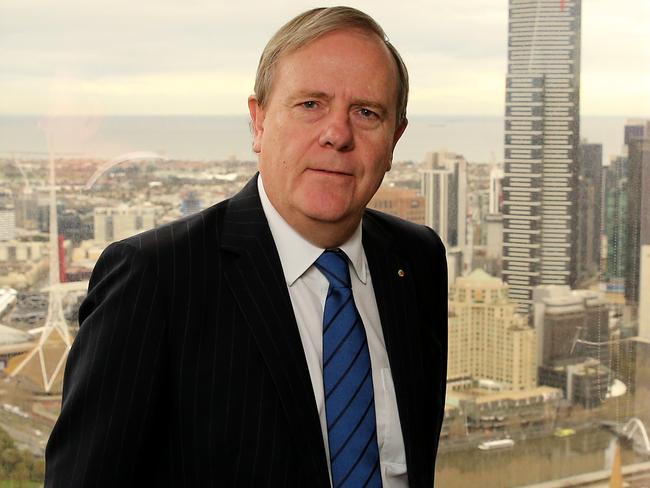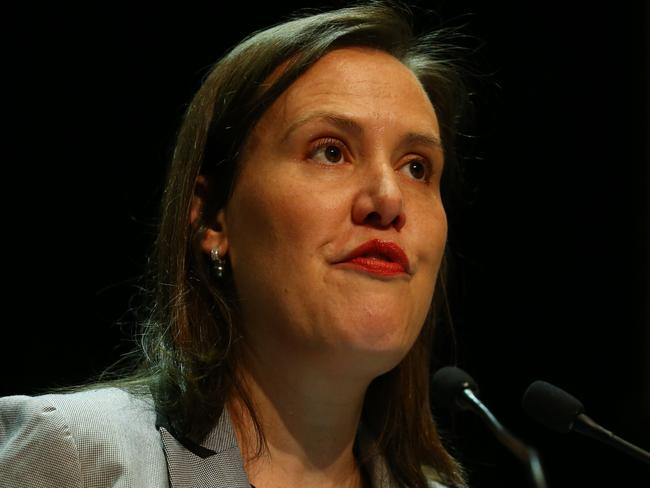Barefoot Investor: Big questions over a super rip-off
THE Royal Commission into Financial Services has proven there are deep-seated problems in the finance industry and we should question the incentives of the people managing our money — and that includes our super funds, writes the Barefoot Investor.
Barefoot Investor
Don't miss out on the headlines from Barefoot Investor. Followed categories will be added to My News.
PICTURE this: You get a bill in the mail: $3850 for “investment services rendered on your super fund”.
Across the country, every adult is also sent a similar bill, with the amount varying depending on the size of their super balance. Some people, often the poorest workers, get three or four bills because they have their super in three or four funds.
That’s effectively what’s happening in Australia, only it’s hidden because your super fund doesn’t invoice you.
Instead, they take it automatically from your super account.
BOM MANAGER RECLASSIFIED PROPERTY TO ENSURE LOAN APPROVAL
BOQ ACCUSED OF ALMOST DOUBLING BORROWERS’ REPAYMENTS
COMMISSION HEARS CBA DELAYED COMPENSATING CUSTOMERS
Still, can you imagine the outcry if these bills arrived in people’s letterboxes?
It would be front page news. There would be protests in the streets.
And then I’d stoke the outrage by saying:
“It gets worse! You’re not getting value for money. Over the long run, 90 per cent of these super funds fail to beat the basic market averages. Yet they’re arrogantly charging you some of the highest fees in the world.”
Billionaire investor Charlie Munger once said, “Show me the incentive, and I’ll show you the outcome”. Well, the Royal Commission into Financial Services is a fascinating case study of an industry with the wrong incentives.
Former Treasurer Peter Costello understands incentives, and he’s angry about the financial outcomes for workers. That’s why at a super conference last year, he argued that the government should take compulsory super out of the hands of bank-run retail funds and union-backed industry super funds, set up its own fund, and incentivise fund managers to bid for the business — lowest fees wins.
You know things are bad when a former Liberal treasurer is suggesting nationalising super savings!
In America they’ve had stunning success with the Thrift Savings Plan (their equivalent of our super), which is administered by the government. Fees are as low as 0.03 per cent.

So let’s compare the two:
We’ll use a typical Aussie earning an average wage over 50 years, in a balanced fund earning 4 per cent p.a. after inflation. The difference is fees: the Aussie fund charges 1 per cent, the Thrift Savings Plan 0.03 per cent.
After 50 years, the balances would be ... Aussie fund: $728,668. Thrift Savings Plan: $977,120.
That’s a difference of $248,452. How’s that for an incentive!
Unfortunately, our super funds don’t have incentives to lower costs.
“Really, the only incentive not-for-profit industry funds have is to be a little cheaper than the retail funds … not to drive fees down to almost zero,” Alex Dunnin from superannuation research house Rainmaker told me.
He’s right.
The reality is that the industry — which has siphoned off $230 billion in fees since 2008 — has no incentive to be thrifty. Why?

Because Aussie customers are unengaged — they’re defaulted into their super fund by their employer, and a percentage of their wage is automatically poured into the fund every year of their 50-year working life.
Here’s how it works:
Retail funds generally have more expensive fees because they’re largely owned by banks, and they need to skim off a healthy profit for their shareholders. Case in point: Colonial First State (owned by CommBank) has just announced it’s slugging super customers with a “regulatory reform fee” to cover costs of complying with ... all the laws they’ve broken?
Industry funds argue that a source of their superior investment returns are their large holdings in unlisted investments, like toll roads and ports, and complex private equity and hi-tech start-up investments. Yet who says they’re any better at picking investments than other professional fund managers — 90 per cent of whom fail to beat the market average over time?
Here’s how it really works:
The ultimate incentive for a CEO at an Aussie super fund is their million-dollar pay packet.
It’s hard to justify being paid a million bucks if you’re investing in simple index funds. So they spend millions on an army of underlings, advertising, and overseas travel visiting all those complex investments. Their incentive is to build an empire … using your money.
“Look, if everyone thought like this — with a hard line focus on fees — it’s true the industry would be a lot more efficient, and consumers would have much bigger retirement balances … but I don’t think it will ever happen,” says Mr Dunnin.
I fear he’s right.
The reason Costello didn’t drive down fees when he was in power is the same reason things will never change: too many highly-paid pigs with snouts in the trough.
So it’s time we kept the bastards honest by highlighting the cheapest super funds (see box).
Always question the incentives of the people managing your money.
After all, there’s no interest like self-interest!
Tread Your Own Path!

Q&A WITH KELLY O’DWYER, MINISTER FOR REVENUE AND FINANCIAL SERVICES, AND MINISTER FOR WOMEN
COSTELLO’S REGRETS
BAREFOOT: Your old boss, Peter Costello, says he regrets not doing more to lower fees on compulsory superannuation. Would you consider tendering out a default fund and making the big institutions bid — lowest fees win?
KELLY O’DWYER: “I actually think Peter made some very good points. It’s very, very clear to me that for far too long people have been ripped off. Super funds need to understand it’s not their money — it’s their members’.
“Look, this cosy, opaque system that we’ve had for many years has come to an end. That’s why in the Budget we got rid of exit fees … because it was a barrier to switch. Our job as the government is to make sure people’s money is protected and ensure they’re not going to be gouged with fees and charges.”
WOMEN AND MONEY
BAREFOOT: You have an interesting remit — responsible for financial services and women. We know women retire on less than men, about $120,000 less. What can you do to change that?
KO’D: “When it comes to super, we know our Budget changes mean that two million women will have their super balance protected from being charged inappropriate insurance. Another 1.3 million women’s super balances will be boosted by $2.5 billion by our plan to cap fees on small balances to 3 per cent, and actively charging the ATO to reunite people with their lost and inactive super. These are very practical measures that are good for women. However, this is a passion of mine, and I’ll have a lot more to say about it in the economic security statement in spring.”
INSURANCE & THE YOUNG
BAREFOOT: I applaud your decision to stop people under 25 being compulsorily charged insurance within super. But the big insurers say it will increase premiums across the board by 30 per cent. What do you say?
KO’D: “I say that young people are being exploited and used as a cash cow for the entire pool of users. And I think that’s wrong.”
THE ROYAL COMMISSION
BAREFOOT: The Royal Commission has shown us there are deep-seated cultural problems in the finance industry. How does the industry win back trust?
KO’D: “There’s no question trust is at an lowest.
“However, understand that the majority of people employed in the industry —‒ some 400,000 people — are actually going about their day and doing a good job.
“The real responsibility falls on those in charge — the boards — and the CEOs need to ensure they act with integrity. And if they don’t, we need our regulators to keep them accountable.”
Originally published as Barefoot Investor: Big questions over a super rip-off


